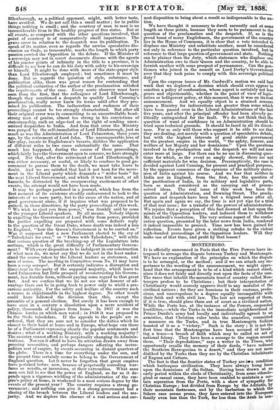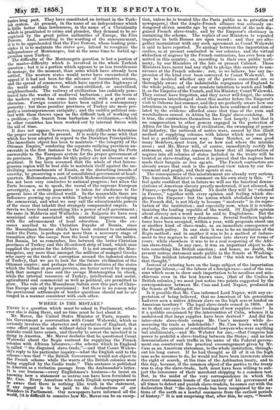MONTENEGRO.
Jr is officially announced in Paris that the Five Powers have in- terposed to arrange the dispute between Turkey and Montenegro. We have no explanation of the principles on which the dispute is to be arranged, or the method ; and if we can attach any im- portance to the wording of the announcement, we might appre- hend that the arrangement is to be of a kind which cannot stand, since it does not fairly and directly rest upon the facts of the ease. The races that inhabit the mountain tract of country called Mon- tenegro profess to be Christians ; but their interpretation of Christianity would scarcely approve itself to any moralist of the civilized nations ; for they are ferocious in their customs, preda- cious, and unscrupulous to a degree equally incompatible with their faith and with civil law. The last act reported of them, if it is true, should place them out of court as a civilized nation. While the Porte has, at the instance of the Powers suspended hostilities,—while the Turks in the immediate neighbourhood of Prince Danilo's army had locally and individually agreed to an armistice, that Christian ruler broke the armistice, committed a massacre on the Turks, and in true Montenegrin fashion boasted of it as a "victory." Such is the story • it is not the first time that the Montenegrins have been accused Of break- ing a truce—a breach of faith which may be called an act of national felony. They have been a scourge to the region around them. "Their depredations," says a writer in the Times, who opportunely recalls the memory of their deeds, "have reduced the Southern Herzegovina to a desert," and they are not more disliked by the Turks than they are by the Christian inhabitants of Ragusa and Cattaro. The fact is that the frontier states of Turkey are ire a condition which burlesques civilization. They have always hung loose upon the dominions of the Sultan. Having been drawn at an early period within the circle of Christianity, from some ethnolo- gical or casual cause, they have been enabled to maintain a cer- tain separation from the Porte, with a show of sympathy for Christian Europe ; but divided from Europe by the Adriatic, by their mountain fastnesses, and by the barbarism to which the Selave race seems prone, they have entered into the European family even less than the Turk, far less than the Arab in cell-
tunes long past. They have constituted an irritant in the Turk- ish system. At present, in the name of an independence which is little better than lawlessness, in the name of a Christianity which is prostituted to crime and plunder, they demand to be re- cognized by the great police authorities of Europe, the Five Powers. And, according to the wording of the announcement, it is to be apprehended that the Five Powers, whose leading prin- ciples it is to maintain the status quo, intend to recognize the independence of Montenegro, but at the same time to forbid ag- gression upon Turkey.
The difficulty of the Montenegrin question is but a portion of the master-difficulty which is involved in the whole Turkish question ; but it is a portion which appears to us less troublesome to manage, for the moment, than some which have already been settled. The western states would never have encountered the appeal if it had not been for the advance of locomotive science, and the spread of commerce, which have carried the highways of the world suddenly to those semi-civilized, or uncivilized, neighbourhoods. The railway of civilization has suddenly pene- trated into the wastes of mediTval barbarism ; and the train of the modern system has come into collision with a great ana- chronism. Foreign countries have been called a contemporary posterity ; but these peculiar provinces of Turkey are more pro- perly a contemporaneous antiquity; and the sudden political con- tact with them throws upon us the difficult task of working out a problem,—the transit from barbarism to civilization,—which in other countries has been worked out by internal forces with the aid of time.
It does not appear, however, insuperably difficult to determine the proper course for ihe present. It is nearly the same with that which has been adopted in regard to the Danubian Principalities. The immediate object has been to maintain "the integrity of the Ottoman Empire," rendering the separate outlying provinces an- swerable in the first instance to the Porte, but making the Porte answerable to the European system for the proper government of its provinces. The grounds for this policy are not obscure or un- practical. It has been assumed that the whole of that hetero- geneous region will be best able to maintain itself against the un- civilizing encroachments of Russia, or the disturbing inroads of anarchy, by preserving a sort of consolidated government at head- quarters. Mahomedanism, and Turkish Mahomedanism especially, has not been very conducive to national progress ; but when the Porte becomes, so to speak, the vassal of the supreme European sovereignty, a certain guarantee is taken for obedience to the general laws of the civilized world. In the meanwhile there are influences growing up even within Turkey which are developing the commercial, and what we may call the educationable powers of the races that inhabit that strangely compounded empire. In Servia we have found something like a power of self-government ; the same in Moldavia and Wallachia ; in Bulgaria we have seen municipal order associated with material improvement, and with the advancement of local education. Even the ex- cesses ascribed to the Christian Rayahs of Bosnia, since the Mussulman Bosniac chiefs have been reduced to submission under the Porte, is perhaps not more than a necessary stage of transition after the escape from the local tyranny of the nobles. But Bosnia, let us remember, lies between the better Christian provinces of Turkey and this ill-ordered strip of land, which once supplied the pirates for the Adriatic. It is not amongst the Mon- tenegrins, any more than amongst the millions of mongrel Greeks who carry on the trade of corruption around the indented shores of Turkey, that we are to look for the future civilization of the Ottoman empire ; and perhaps the ultimate destinies of the states which the Sultan at present governs, are better served by keeping both that mongrel race and the savage Montenegrins in check, while the internal resources of Turkey, intellectual and social, agricultural and commercial as well as political, are permitted to grow. The rule of the Mussulman Sultan over this part of Chris- tian Europe can only be provisional ; but there is no reason why the provisional settlements of border questions should not be ar- ranged in a manner consistent with each other.



























 Previous page
Previous page